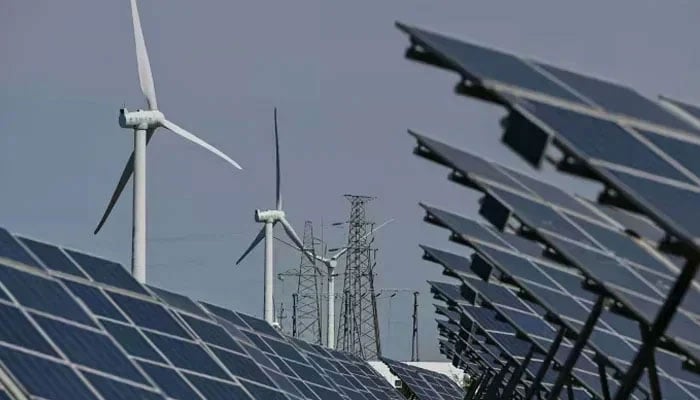Big mistake?
The government of Bangladesh is implementing dozens of incentives to encourage residential solar power installations. Here are some of the key incentives: Guaranteed pricing for electricity generated from solar power, making it more attractive for homeowners to invest in solar systems. Just imagine, tax exemptions, low-interest loans to homeowners, and subsidies to reduce upfront cost of Solar Home Systems (SHS), net metering.
Picture this: making Green Energy funds available to provide financial support for residential solar projects. Microfinance programmes, making funding available for R&D projects aimed at improving home solar technology. New buildings are now required to include solar panels in their design to obtain utility connections. Yes, rural electrification programmes to promote solar power in rural areas. Is the government of Pakistan going in the opposite direction?
In India, the finance minister, in her Interim Budget 2024-25, has made a commitment to enable one crore households up to 300 units of free electricity through rooftop solarisation. This is what the government of India along with various state governments are implementing: Imagine, up to 40 per cent subsidy on solar panels for residential users under the Ministry of New and Renewable Energy (MNRE) scheme.
One-time capital subsidy for installing rooftop solar systems, net metering, tax benefits, generation-based incentives, zero interest loans, and tax exemptions. Homeowners generating solar power can earn and trade Renewable Energy Certificates (RECs) for additional revenue. Solar bonds to raise funds for residential solar projects, community solar programmes, and state renewable purchase obligations. Solar Power Purchase Agreements (PPAs), long-term agreements to buy solar power at predetermined rates, ensuring financial stability for homeowners.
Yes, financial incentives for battery storage, obligations for utilities to purchase a certain percentage of their power from renewable sources, indirectly benefiting residential solar producers. Mandatory solar installations, regulations requiring new residential buildings to include provisions for solar power installations. Is the government of Pakistan going in the opposite direction?
Here’s a partial list of countries where their respective governments are incentivizing installation of home solar systems through a whole host of schemes, policies and financial incentives: Afghanistan, Ethiopia, Ghana, Myanmar, Rwanda, Nepal, Bolivia, Zambia, Cameroon, Sudan, Senegal, Uzbekistan, Haiti, Nicaragua, Libya, Malawi, Botswana, Bhutan, Fiji, Panama, Azerbaijan, Armenia, Jordan, El Salvador, China, India, Bangladesh, Brazil, Mexico, Morocco, Columbia, Vietnam, Tunisia, Uruguay, Peru, Philippines, Argentina, Kenya, South Korea, Turkey, Chile, Egypt, Malaysia, Indonesia, Israel, Thailand, Australia, Japan, the UK, Canada, France, Spain, Italy, Sweden, Singapore, Ireland, Poland, Denmark, and New Zealand.
All these governments have three things in mind: to ensure energy security, promote renewable energy and reduce carbon emission. What does the government of Pakistan have in mind? Is the government of Pakistan going in the opposite direction? Governments around the world are reducing financial barriers to adopt solar power making it more accessible and attractive to residential users.
Three questions: Is the government of Pakistan really preparing to take a divergent path? What are the real factors leading the government of Pakistan to pursue a contrasting course from the rest of the world? What is really motivating the government of Pakistan to veer off in a totally different direction?
The writer is a columnist based in Islamabad. He tweets/posts @saleemfarrukh and can be reached at: farrukh15@hotmail.com
-
 Expert Reveals What Makes Investigations Hard In Search Of Savannah Guthrie Mother Nancy: 'Silent Witness'
Expert Reveals What Makes Investigations Hard In Search Of Savannah Guthrie Mother Nancy: 'Silent Witness' -
 'SNL's Strongly Reacts To BAFTA's Racial Slur With Tourette’s Sketch
'SNL's Strongly Reacts To BAFTA's Racial Slur With Tourette’s Sketch -
 Austin Shooting Leaves Multiple Dead, Dozens Injured
Austin Shooting Leaves Multiple Dead, Dozens Injured -
 Meghan Markle Friends Break Silence As Duchess Plan To Return To UK
Meghan Markle Friends Break Silence As Duchess Plan To Return To UK -
 Dua Lipa Stuns Everyone On And Off Stage At 2026 BRIT Awards
Dua Lipa Stuns Everyone On And Off Stage At 2026 BRIT Awards -
 2026’s Most Visited Websites Revealed: ChatGPT Overtakes Major Platforms
2026’s Most Visited Websites Revealed: ChatGPT Overtakes Major Platforms -
 Worst Cricket Moments That Shocked The Game
Worst Cricket Moments That Shocked The Game -
 Prince Harry, Meghan Markle Reach A Crossroads: ‘You Could Lose Everything’
Prince Harry, Meghan Markle Reach A Crossroads: ‘You Could Lose Everything’ -
 F1 Title Race: Who Will Win 2026 Drivers’ And Constructors’ Championships?
F1 Title Race: Who Will Win 2026 Drivers’ And Constructors’ Championships? -
 New Observatory Sends 800,000 Asteroid Alerts In One Night
New Observatory Sends 800,000 Asteroid Alerts In One Night -
 Cher’s Son Elijah Blue Allman Apprehended On Two Counts Of Assault At Elite Prep School
Cher’s Son Elijah Blue Allman Apprehended On Two Counts Of Assault At Elite Prep School -
 Beatrice, Eugenie Now Face Andrew, Sarah's ‘nightmares’: 'They're Hugely Conflicted'
Beatrice, Eugenie Now Face Andrew, Sarah's ‘nightmares’: 'They're Hugely Conflicted' -
 X Debuts Topic Filtering To Help Users Shape Their ‘For You’ Recommendations
X Debuts Topic Filtering To Help Users Shape Their ‘For You’ Recommendations -
 Scientists Built World's First Computer That Learns Like Human Brain
Scientists Built World's First Computer That Learns Like Human Brain -
 Robert Carradine’s Daughter Makes Bombshell Confession As Actor's Death Cause Confirmed
Robert Carradine’s Daughter Makes Bombshell Confession As Actor's Death Cause Confirmed -
 Beatrice, Eugenie Put On Blast: ‘Only Nitwits Wouldn’t See An Association With A Pedophile As Toxic’
Beatrice, Eugenie Put On Blast: ‘Only Nitwits Wouldn’t See An Association With A Pedophile As Toxic’




